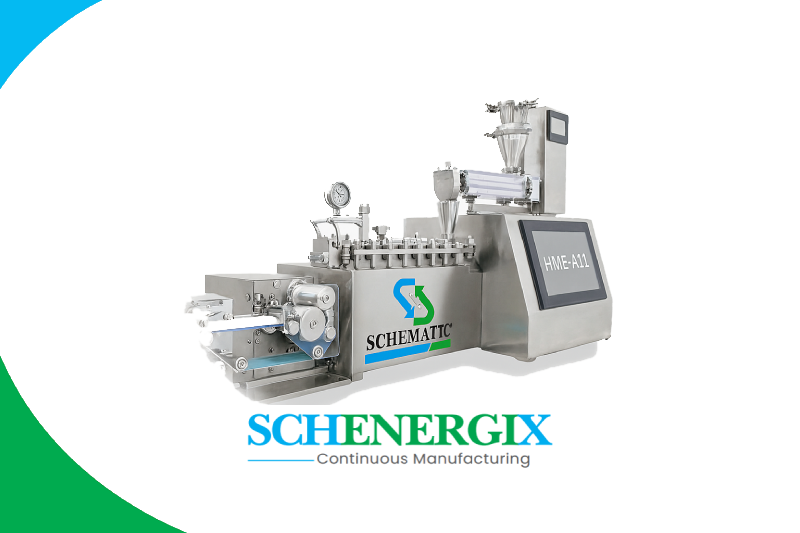

August 3, 2025
The Rise of Continuous Manufacturing in Pharma: What’s Driving Industry Change
In pharmaceutical manufacturing, the move from traditional batch processing to continuous manufacturing is one of the most significant shifts in recent decades. Driven by evolving regulatory guidance, rising efficiency demands, and advanced processing technologies, continuous manufacturing is no longer a future concept—it’s happening now.
At Schenergix, we work closely with pharmaceutical companies that are making this transition, helping them understand what continuous manufacturing means for their operations and how they can take practical steps towards implementation.
What Is Continuous Manufacturing?
Continuous manufacturing is a production method where raw materials are continuously fed into a process, and finished products are constantly discharged. This contrasts with batch manufacturing, where production is segmented into defined steps with downtime between each stage.
The continuous model creates a seamless flow of materials, offering better control, reduced waste, and more efficient use of resources. For pharmaceutical companies, this approach aligns with increasing pressure to reduce production time while maintaining the highest standards of quality and compliance.
What’s Driving the Shift?
1. Regulatory Encouragement
In the past, regulatory uncertainty held many pharmaceutical manufacturers back from adopting continuous methods. Today, however, agencies like the FDA and EMA have shown clear support for continuous manufacturing as part of their drive toward modernised, science-based production systems.
The FDA’s Emerging Technology Program and the EMA’s guidelines now offer a more structured framework for companies to introduce continuous systems, focusing on product quality, risk management, and real-time release testing.
Schengergix stays informed on regulatory developments and supports clients in meeting compliance expectations during and after the transition to continuous production.
2. Demand for Efficiency and Agility
Global healthcare demands are shifting. From personalised medicine to pandemic preparedness, manufacturers must respond faster than ever. Continuous manufacturing enables shorter development cycles and more agile production, particularly important for:
- Time-sensitive treatments
- Personalised dosages
- Niche or orphan drugs
At Schenergix, we help clients design systems that can adjust quickly to varying production volumes without compromising on consistency or control.
3. Technological Advancements
Advances in sensors, automation, and data analytics have made continuous manufacturing more achievable and more effective. Inline monitoring tools allow for real-time process control and quality assurance, reducing the need for manual sampling and lab-based testing.
These technologies also support the development of digital twins, predictive maintenance, and enhanced scalability—features that Schenergix integrates into its solutions for pharmaceutical clients seeking end-to-end visibility and control.
Benefits of Continuous Manufacturing
The case for continuous manufacturing is strong. Pharmaceutical companies that make the shift report significant improvements across a range of metrics:
- Reduced cycle times: Continuous flow eliminates the delays associated with batch changeovers and manual cleaning.
- Greater consistency: Automated systems ensure uniformity across every unit of output.
- Smaller facility footprints: Systems can be compact, reducing space and energy needs.
- Lower costs: Less downtime, fewer rejects, and less waste all contribute to long-term cost savings.
With the right planning and support, these benefits are not limited to large corporations. Schenergix works with small and mid-sized pharma businesses to implement scalable systems that fit both their size and strategy.
Applications of Continuous Manufacturing in Pharma
Sectors where continuous methods are gaining traction include:
- Oral solid dosage: Continuous blending, granulation, drying, and tableting processes are replacing batch methods for tablets and capsules.
- Biologics: Continuous perfusion and purification techniques are helping biologic drug manufacturers improve yield and stability.
- API synthesis: Flow chemistry allows for safer, more controlled reactions and easier scale-up in API production.
Schengergix supports these applications with equipment integration, process design, and technical consultancy tailored to each client’s product and regulatory needs.
Addressing Common Concerns
Is continuous manufacturing only for large companies?
Not at all. Schenergix works with clients of all sizes. Smaller firms benefit from the agility and cost savings continuous systems provide, especially in niche markets.
Is the switch from batch to continuous disruptive?
There is a transition period, but it can be managed in phases. Schenergix helps clients assess readiness, develop pilot systems, and train teams, ensuring a smooth shift that aligns with operational goals.
Does continuous manufacturing change regulatory approval processes?
Regulatory authorities still expect evidence of quality, safety, and efficacy. However, they increasingly support continuous methods. Schenergix guides clients through documentation and validation processes to maintain full compliance.
What about maintenance and system complexity?
Modern continuous systems are designed for reliability, with built-in diagnostics and remote monitoring. Schenergix provides ongoing support and training to reduce downtime and keep operations running smoothly.
How Schenergix Supports Continuous Manufacturing
Schengergix helps pharmaceutical companies explore, design, and implement continuous manufacturing strategies. Our support includes:
- Feasibility assessments and system planning
- Equipment selection and integration
- Process optimisation and real-time monitoring setup
- Compliance support aligned with FDA, EMA, and ICH guidelines
- Training and ongoing technical consultancy
Whether you're transitioning from batch production or starting with a new facility, Schenergix ensures your continuous manufacturing strategy is robust, scalable, and fit for regulatory scrutiny.
Ready to explore continuous manufacturing for your pharmaceutical production line?
Contact the team at Schenergix to learn how we can help you design smarter, faster, and more compliant manufacturing solutions.



